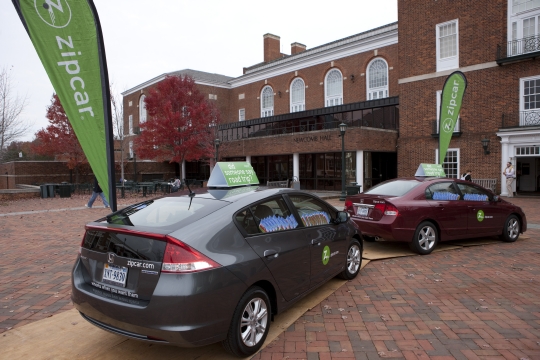Incentives for carpooling and public transit, encouragement for bicycles and electric vehicles and on-demand transportation services are among the transportation initiatives the University of Virginia has put in place in its quest to lighten its environmental impact.
“We’re concerned with relieving local traffic congestion and reducing the University’s transportation carbon footprint,” said Rebecca White, director of U.Va.’s Department of Parking & Transportation. “We’re looking at a variety of ways to move more students and University employees with less traffic on the roadways.”
U.Va. has initiated an ambitious carpooling program, called Cavpool, offering carpool members special discounts and prime parking spaces, among other incentives. More than 120 carpooling groups, involving around 300 riders, have already signed up.
“Carpooling is an environmentally and financially responsible commuting decision,” White said. “We have recently added six carpool spaces around Grounds, which brings us to 31 spaces.”
Employees looking to start or join a carpool can sign up through Zimride, a ride-sharing program that matches drivers and riders, either on a long-term or occasional basis. U.Va. partners with the University of Richmond, Blue Ridge Community College, Virginia Polytechnic Institute and State University, Virginia Commonwealth University, Wake Forest University, West Virginia University, George Mason University and the University of Maryland in offering this service.
As of mid-December, U.Va.’s Zimride program included 3,050 users who posted 2,377 rides, White said.
The University also provides carpoolers with transportation home in the event of an emergency.
“If there is a problem or something out of the ordinary, the carpool member is covered,” White said. “We have RideShare's Guaranteed Ride Home program that will cover the cost of a taxi fare or rental car.”
The University also provides the Zipcar service, for people who only need vehicles occasionally. The cars are available for hourly or daily rentals to members of the service who do not have automobiles on Grounds. Cavpool members received additional rental discounts for Zipcars.
Zipcars are also an option for students. First-year students, almost all of whom live on Grounds, are not allowed to have cars and White said there has been a reduction of parking permits for students who live on Grounds.
“Our Zipcar utilization has triggered a seventh Zipcar on Grounds,” White said. “We have also relocated the cars to the Medical Center and Darden Boulevard, which has generated a higher utilization.”
Zipcar makes transportation available for short trips, but the students, faculty and staff also have access to the University and city bus systems. Students and University employees may ride for free on Charlottesville Area Transit buses with their U.Va. identification cards. The University provides a subsidy to the city for this benefit, and is seeing a return: Bus ridership among students and University employees has nearly doubled in the past five years.
The University Transit System has also been using satellite GPS transponders on its 34 buses to make the system more accessible to riders and better manage the system. The transponders allow a computer monitor and a central dispatcher to track all the buses at any given minute – and share that information with waiting passengers.
“The passengers get information about when to go to the bus stop and how long they have to wait,” White said. “In the back office, it gives us better data about on-time performance, traffic patterns, how long it takes to load, speed through traffic corridors – information that is very valuable for us.”
The buses themselves are more sustainable, running on biodiesel, a combination of standard diesel fuel and oil from renewable sources. P&T has been using the biodiesel for several years and has noted no major detrimental affects on the buses.
“Our biodiesel use varies throughout the year, but if you average it out over the past five years, we displaced about 30,000 gallons of petro-diesel per year with biodiesel,” White said.
For those who seek to get around without using any gas, the University is also very bicycle friendly, offering an abundance of bicycle racks, safety and maintenance classes, as well as bicycle lanes. Two public bicycle repair stations are in place, the first at Clark Hall and now a second one at the School of Architecture.
The University is also experimenting with charging stations for electric vehicles. A charging station has been installed in the Emmet/Ivy garage to fuel a car that an engineering class converted to run only on electricity. The car is charged from the garage’s electric grid, but the draw-down has been partially offset by a solar collector installed on the roof of the adjoining bus kiosk. A similar installation for use by the public is planned for the Central Grounds Garage.
Media Contact
Article Information
December 20, 2012
/content/alternative-transportation-key-element-uvas-sustainability-efforts

